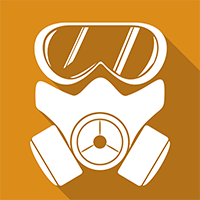Health & Safety in the Workplace
Our courses are tailored to meet the evolving needs of youth workers, offering hands-on training & resources that address challenges in social education.
Allergen Awareness

This course covers general allergies, food allergies and food intolerances and explains the differences between them. It covers the 14 allergens controlled by legislation along with food additives and how they can trigger allergic reactions. It takes a detailed look at the symptoms of food allergies and takes in the wider picture discussing the current theories of why rates are increasing. It then finishes off by covering practical steps that can be taken to reduce the risk from allergens and also what steps can be taken both internally and externally to monitor the control measures.
Asbestos Awareness

As well as informing you about the risks of working with asbestos, the course will deliver a lot more information about: Recognising asbestos, where it's used, minimising the risks and the legislation about working with asbestos.
Asbestos Awareness for Architects and Designers

As well as informing you about the risks of working with asbestos, the course will deliver a lot more information about: Recognising asbestos, where it's used, minimising the risks and the legislation about working with asbestos. This course is a variation on the Asbestos Awareness course that contains specific information for designers and architects.
Asbestos Awareness – IATP

As well as informing you about the risks of working with asbestos, the course will deliver a lot more information about: Recognising asbestos, where it's used, minimising the risks and the legislation about working with asbestos.
Banksman Training

This course will cover common vehicle reversing accidents and the crucial role played by the banksman. It'll also look at the controls and actions that can reduce the likelihood of such accidents.
Basic Legionella Management

Explaining the background to Legionella and Legionnaires' Disease, the potential risks associated with water systems and how these can be prevented or controlled.
Behavioural Safety

This course defines behavioural safety and explains the origins of the concept. It covers how it can be implemented in the workplace and some of the potential benefits. It includes analysis of some examples of 'at risk behaviours' and some examples of ways you can measure how well your organisation is doing when it comes to safety. Finally it touches on some of the key laws regarding health and safety in the workplace and how to ensure positive workforce attitudes.
Control of Substances Hazardous to Health (COSHH)

This course covers what you need to know about the Control of Substances Hazardous to Health. It's aimed at anyone who is exposed to Substances Hazardous to Health at work, as well as line managers with responsibility for such people.
Covid-19 Safe Workplaces

This course explores the risk to workers caused by the Covid-19 virus and covers actions that can be taken by employers and employees to protect themselves and each other as they return to work. The content of this course is based on the latest information from the UK government and the NHS. It covers information about the virus, risk assessments and personal safety, along with how to make changes to the daily work environment to address these risks
Display Screen Equipment Awareness

This course is aimed at users of display screen equipment, or DSE as it's often called. DSE is a term that covers a wide range of equipment. If DSE equipment like this is not set up correctly, users are at increased risk from certain disorders. As an employee, you share the responsibility to keep people safe at work. That means undergoing relevant training and ensuring that rules are followed.
Drug and Alcohol Awareness

This course is intended to provide you with the information you needed to understand and spot the signs of drug and alcohol misuse. It covers the legal and social implications for the individual and for your company if you find out an employee is misusing drugs. This course discusses the law, different types of drugs, and policies that can be put in place to protect yourself, your business and your employees.
Electrical Safety

This course will start by covering the many benefits electricity brings to society, as well as its key components voltage, current and resistance. It will explain the two main types of electricity, cover UK accident and death statistics, and describe a simple way of remembering the electrical hazards. It then goes on to provide basic instructions about how you could safely help someone you suspect has received an electric shock.
Emergency First Aid at Work – Online Annual Refresher

This Emergency First Aid Refresher course will highlight some of the most common situations that you might come across and the actions that you can take to help.
Environmental Awareness

This online course aims to increase your awareness of major environmental issues and provide an introduction to environmental management systems.
Hand Arm Vibration Syndrome

This short course provides you with an introduction to Hard Arm Vibration Syndrome, otherwise known as HAVS. You will learn about the symptoms and consequences of the disorder along with the risks, responsibilities and laws.
Lock Out, Tag Out (LOTO)

This course provides an overview of Lockout/tagout (LOTO) - the safety practices and procedures that ensure dangerous machines are properly shut off during service, repair or maintenance.
Managing Occupational Health and Wellbeing

This course explains the key elements, procedures and activities involved in successful Occupational Health and Safety Management in the workplace. The course show how professional Occupational Health and Safety Management benefits individuals and organisations.
Working in Confined Spaces

This course will cover the legislation associated with working in confined spaces. What constitutes a confined space, the potential hazards, safe operating procedures, and emergency procedures and rescue. Important note: This is an awareness course only, designed for people who need to be aware of the hazards and risks of confined space working but are not required to enter a confined space. If you are required to perform any work activity in, or in the proximity of, a confined space then you will also need to have an 'approved' standard of practical training at the 'appropriate' level.
Working Safely

Working safely is in the interest and concern of all staff, both employers and employees. Health and safety is one of the few areas where the law places specific duties specifically on employees so a knowledge of where this applies and how to ensure that it is adhered to is vital to protect individuals and businesses. The course covers a wide range of topics including fire safety, asbestos awareness, working at height, COSHH, PPE and electricity. It also covers schemes for improving safety performance and methods of protecting the environment.
Workplace Health and Safety

At the end of this course you will have an understanding of health and safety legislation and you'll be able to list common causes of accidents. You'll also be able to understand good practice in relation to electricity and describe the use of safe manual handling techniques as well as be able to describe good practice associated with COSHH regulations, be able to describe your action in the event of a fire and also you will know how to deal with an accident.

